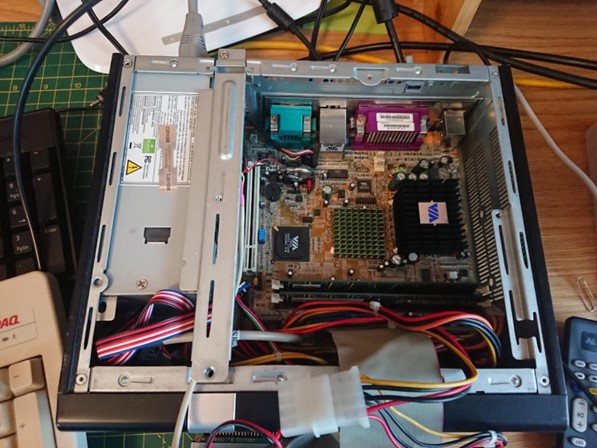Getting DOS Audio working on a VIA EPIA-5000 Mini-ITX
I am a huge fan of Mini-ITX motherboards. Especially fan-less ones. They run with zero noise, are very power efficient, and the newer ones are just as capable as most non-gaming ATX motherboards.
I have about 7 Mini-ITX motherboards in my retro collection. Some of those are new enough even to run Windows 10 (albeit slowly), but most are too slow for modern operating systems (even non-GUI Linux is sluggish and of limited use for modern workloads).
This post is about how to fix the problem where SoundBlaster and AdLib audio does not work in DOS games on the VIA Epia 5000 mini-ITX motherboard.

(My VIA Epia 5000 mini-ITX motherboard, in a small case. Out of shot is a slimline CD-ROM and 2.5" HDD)
Unlike the later boards that VIA produced, the Epia 5000 not only has on-board AC'97 Audio which is ideal for early Windows support, but also has SoundBlaster Pro, AdLib, AND MPU-401 MIDI emulation. This means that any DOS game that has audio support for this emulated hardware should work. SoundBlaster cards are quite rare/expensive these days – there are alternatives like the Snark Barker and the OPL2LPT (among others), but these are not cheap either and are of limited availability. The Epia 5000, having SB/AdLib and MIDI emulation built in, makes it an ideal DOS gaming platform.
Getting it working
Epia 5000 boards with earlier BIOS revisions lower than 2.07 should be able just to install the main VIA Audio Drivers for DOS, and everything should work.
However, if your BIOS revision is 2.07 (as mine is), the VIAAUDIO.COM drivers will not work. They don't complain or anything – there's just no sound.
The workaround for this is to use the VIASBCFG drivers instead, which are available over at the VOGONS Vintage Driver Library. Specifically, the file VIAFMTSR.COM which, despite the name, enables all audio, including MIDI playback. The VIAFMTSR.COM should be put in your autoexec.bat so that it loads and stays resident after every boot.
Reading posts over at VOGONS, it's also recommended to have ALL the audio options enabled in the BIOS AND enable the 'game port' option - even though the Epia 5000 doesn't have one!
Of course, your mileage may vary on this, but this is what worked for me.